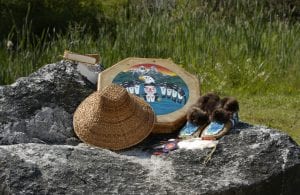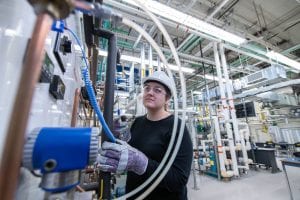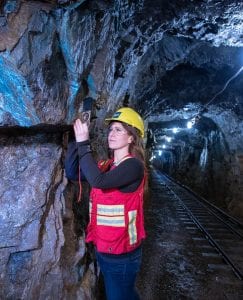Every day engineers harness the principles of science to lay foundations and build frameworks that support our society. As the world faces new social and environmental challenges, along with revolutionary technological transformations, we need engineers like never before.
BCIT helps prepare the next generation for work in this dynamic field. Hear from three students on how they’re getting ready to change Canadian engineering for the better.
Approaching engineering from a holistic perspective

Nicolas (Nic) Johnson is acutely aware of the challenges facing the world today, and is eager to find innovative solutions. And the BCIT Civil Engineering diploma is providing him with a launch pad.
“You’ve got to be the change that you want to see in the world,” he says. “Being raised in an Indigenous family, you think a little bit more holistically, and I would say that I’m an environmentalist at heart.”
As such, Nic has big goals for the types of projects he’d like to manage after graduation. “I’d like to work on renewable energy. I’d like to work on highway design for when we have driverless cars, because it’s going to change drastically how we do that. I’d like to work on Ecocity stuff, because sustainable development is not just a buzzword—it’s something that we actually have to do.”
Though he’s still in the process of getting his diploma, Nic has already received job offers from four different organizations—and is enjoying having options. With a Civil Engineering diploma, he can choose to pursue a career or continue on to earn a Bachelor of Engineering in Civil Engineering. “Most universities do not offer that,” he explains. “The benefit of the BCIT program is that you get hands-on technical experience right away. This is my opportunity to find out if I like it.”
Using engineering to advance social justice and sustainability

For Reeghan Osmond, engineering goes hand-in-hand with green solutions and innovations, and it’s this passion for environmental protection and sustainable development that led her to pursue a degree in Mechanical Engineering. Not only is it a flexible and versatile field, but it’s one that helps people understand how materials can be sourced and used in better ways.
“Engineers are the people who build things and tell people how to build things; what materials they should use, how they should dispose of the materials, and what the end of the product life cycle should be,” says Reeghan. “So engineers, in my opinion, are the people who should be looking more at the environmental impacts of what they’re doing rather than simply just looking for profits. I think engineers are the people who should be taking control of climate action.”
She plans to continue her studies post-graduation, combining the practical skills she’s gained at BCIT with a more theoretical, research-based master’s degree. But she’s already helping to advance social justice and sustainability worldwide as a member of Engineers Without Borders.
SEE MORE: Want to be an engineer, but not sure what kind? Read this first.
“We raise money for communities in sub-Saharan Africa, so instead of going in and just giving them a well, for instance, we invest in their own ideas because they know the area better than we would,” she explains. “It’s helping me realize the impacts of what I will be doing in the future.”
Providing mentorship to women in engineering

In addition to growing her own skills in Mining and Mineral Resource Engineering, Megan Gent has been engaging with the student community at BCIT. When she enrolled in the program, the bachelor’s degree was a new offering—and though she was active in the Women in Engineering Club, Gent realized that her program needed an association of its own. So she started the Mining Engineering Club.
She’s also responsible for bringing BCIT to the Canadian Mining Games, a friendly competition between universities. “I found out about the Mining Games between my first and second year while at a conference in Montreal and I thought, ‘We have this brand new mining engineering degree, why aren’t we involved?’” Megan then spent the next year communicating with the event’s organizers to figure out what BCIT needed to do to participate, and this past February, the school sent its first-ever contingent.
Even as a brand new team, BCIT medalled in six events—a testament both to Megan’s leadership and the Engineering program in general. “Vancouver is a huge mining hub, not just for Canada but internationally,” she says. “We surprised ourselves, and a lot of people there I think.”
Have you subscribed? Sign-up to receive the latest news on BCIT.
When she graduates, Megan is looking forward to not only working in the field, but also mentoring women in mining engineering and encouraging girls in high school to give it a try. “We need mining for everything,” says Megan. “Everything we do, every technological advancement, every innovation—everything needs mining. I think that’s what got me more passionate about it.”
The world is complicated, and that’s why we need engineers—problem-solvers who are not only committed to excellence at work, but who are also conscientious leaders in their communities. If you’re passionate about making a difference, we encourage you to contact our advisors and see which program is right for you.
